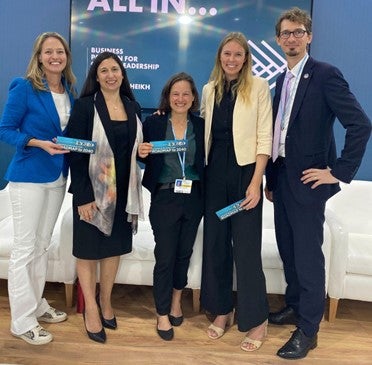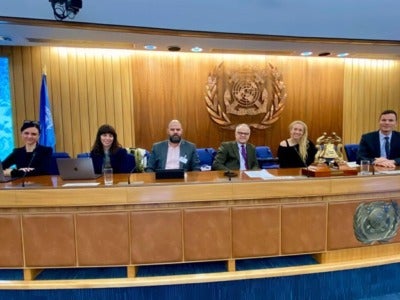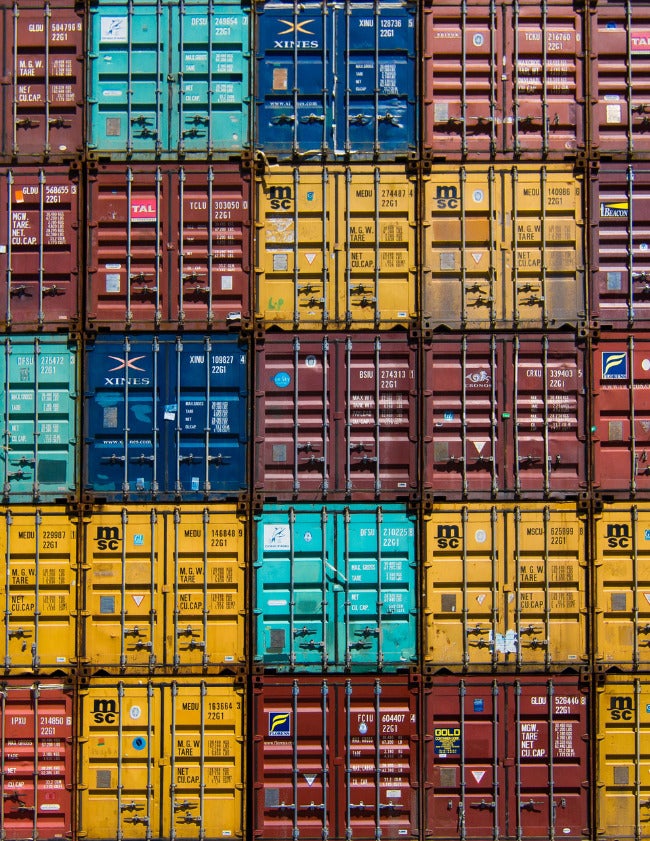With momentum around maritime shipping decarbonization discussions building over the last few years, 2023 is set to be an exciting and consequential year. Between planned revisions to the International Maritime Organization’s (IMO) – the global regulator of shipping – Initial Greenhouse Gas Strategy, the continued strong interest in green maritime shipping corridors, and climate-leading cargo owners’ growing integration into decarbonization discussions and projects, there’s a lot to look forward to in 2023.
While the Aspen Institute Energy & Environment Program’s Shipping Decarbonization Initiative (SDI) team is looking forward to contributing to maritime shipping decarbonization progress in 2023, the start of a new year provides an opportunity to look back at some of the major successes at the end of 2022 that are driving the conversation as we emerge into 2023.
In November and December 2022, members from the SDI team participated in COP27, the yearly United Nations Climate Change conference where countries around the world gather to discuss global action toward addressing climate change in Sharm El Sheikh, Egypt, and the International Maritime Organization’s Marine Environment Protection Committee meeting in London, the IMO’s committee which addresses environmental issues under IMO’s remit, including greenhouse gas emissions.
While it’s impossible for us to capture all the relevant information we learned at COP27 and the IMO MEPC meeting in one short blog, here are three of our biggest takeaways from our time in Egypt and London.
Maritime shipping decarbonization – and the role of cargo owners – was firmly on the agenda
In many ways, maritime shipping decarbonization discussions on the international climate stage are new (beyond discussions at the IMO). Last year’s COP26 in Glasgow, Scotland was the first time that maritime shipping decarbonization was included in the COP agenda in any major way. Building off the conversations in Glasgow, COP27 saw an explosion of both official and civil society sponsored side events related to maritime shipping decarbonization and the sector’s transition to zero emissions.
Not only were the number of shipping events at COP27 noteworthy, but the distribution of events over the two weeks was also impressive. As is standard at COPs, days are divided into different “Themes” to help focus conversations and group related events together. In an agenda put together by Katharine Palmer, the Shipping Lead for the UN Climate Champions team, events relevant to shipping decarbonization were featured on every single day of COP27, demonstrating the wide relevance of decarbonizing this sector to issues around energy, biodiversity, finance, adaptation, and more.
The Aspen SDI team took part in several of these shipping events during our time in Sharm El Sheikh. For our team, one of the highlights was a panel we co-hosted with The Climate Pledge in the We Mean Business Pavilion to celebrate the launch of the “coZEV Roadmap to 2040”, which outlines action areas cargo owners can start taking in 2023 to enable full decarbonization of their ocean freight by 2040. This panel was an in-person opportunity to bring together two of our coZEV 2040 Ambition Statement signatory companies, Amazon and Tchibo, and some of our cross-value chain partners from the UN Foundation and the Global Maritime Forum to celebrate the ambition of climate-leading cargo owners.

From L-R: Ingrid Irigoyen (Aspen Institute), Teresa Christopher (Amazon), Susan Ruffo (UN Foundation), Sina-Maria Schoenlein (Tchibo), and Lau Blaxekjær (Global Maritime Forum) after the Aspen Institute and Climate Pledge-hosted panel at COP27.
The importance of cargo owner ambition to drive shipping decarbonization also featured prominently at the IMO’s Marine Environment Protection Committee meeting held a few short weeks after COP27 in London. The Aspen SDI team co-hosted a panel with the United States delegation featuring perspectives from across the shipping value chain, including coZEV signatories Amazon and Philips, on the importance of a smooth, fast, and economically viable transition to zero emissions across the industry.
The ocean takes center stage at COP27
Although the ocean covers over 70% of the planet, the impacts of climate change on the ocean, and the potential of the ocean to be a source of climate solutions, has not been featured prominently at previous COPs. This year, however, the ocean had a home inside the COP Blue Zone (an area of the conference which hosts the official plenary space, negotiation rooms, country and theme pavilions, and side event space) with the first ever Ocean Pavilion. Led by the Woods Hole Oceanographic Institution and Scripps Institution of Oceanography at UC San Diego, the Ocean Pavilion served as a central hub for over 15,000 ocean-minded conference delegates. More than 60 events addressing climate change by leveraging the ocean were hosted at the Ocean Pavilion during COP27.
Beyond our work on shipping decarbonization, the Aspen SDI team has a long and diverse background working on various ocean issues at the local, national, and global levels. The Ocean Pavilion events gave us the rare opportunity to reconnect with old friends and colleagues who valued the designated space as much as we did. We were inspired by the diversity of programming at the Ocean Pavilion and are already contemplating how we can better integrate shipping decarbonization into the agenda of next years’ Ocean Pavilion in the United Arab Emirates.
For other takes on the ocean outcomes of COP27, check out these posts by One Ocean Hub, the Ocean & Climate Platform, and the World Economic Forum.
High expectations for COP28 and IMO MEPC 80
One of the biggest headlines from COP27 was the breakthrough agreement of the creation of a “loss and damage” fund to help fund adaptation and mitigation in the countries most impacted by climate change, but who have historically contributed very little to greenhouse gas emissions. While this was a crucial first step, and one that was unexpected by many experts, the eyes of the world will be on negotiators at next years’ COP28 in the United Arab Emirates to see how this fund will be enacted.
Additionally, despite the many announcements of progress made during COP27, stakeholders all around the world are concerned about the viability of staying on the 1.5 degree trajectory laid out in the Paris Agreement. Creating a pathway to 1.5 degrees will require major sectors of the global economy, including maritime shipping, to drastically reduce their emissions.
Like Egypt, UAE has strong maritime shipping and ocean connections. The UAE Port of Fujairah is the third largest re-fueling hub for ships in the world, Dubai-headquartered DP World is a maritime shipping logistics, cargo handling, and port terminal operator conglomerate which handles almost 80 million TEU of cargo a year, and the coastal areas in UAE are home to coral reefs and extensive mangroves.
Similarly, there’s high expectations for the next IMO MEPC meeting (MEPC 80) next July, where the IMO is set to revise its Initial Greenhouse Gas Strategy. After MEPC 79 in December 2022, there’s increasing pressure on MEPC 80 to set a zero emission by 2050 decarbonization goal alongside a basket of mid-term measures to put the sector on a pathway to achieve this zero emission ambition.

From L-R: Dr. Gwynne Taraska (U.S. State Department), Kathryn Benz (Aspen Institute), Alexandros Theodoropoulos (Philips), Chris Davis (Amazon), Dr. Charlotte Kirk (Fortescue Future Industries), and Florian Gabmeier (MAN Energy Solutions) during the Aspen Institute and United States side event at the IMO.
Experts have shown that for the maritime shipping sector to be on a 1.5 degree trajectory, zero emission fuels need to make up 5% of the international shipping fuel mix by 2030. While accomplishing these emissions reductions goals within the maritime sector – and for the global economy as a whole – will not be easy, the goal of 1.5 degrees must stay alive for the health and wellbeing of our planet and all who live here. Our team looks forward to exploring ocean and maritime shipping-climate solutions at COP28 and IMO MEPC 80, among other major convenings in 2023, so that the globe can fully take advantage of all the ways the ocean can help society stay on a 1.5 degree trajectory.

